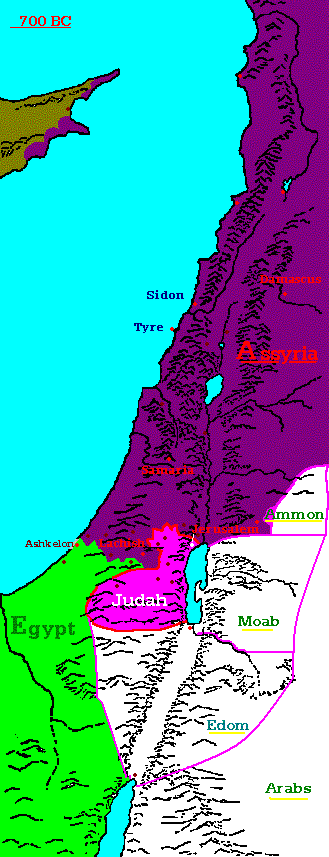Prepare Ye the Way
700 - 600 BC, the Holy Land
700 - 600 BC, the Holy Land
 Jerusalem was saved from Sennecherib, but the fact of Assyrian dominance was clear.
For years, King Menasseh paid a bitter tribute to Nineveh while the Temple fell into disrepair, the priesthood was persecuted and Mesopotamian idolatry was everywhere.
Jerusalem was saved from Sennecherib, but the fact of Assyrian dominance was clear.
For years, King Menasseh paid a bitter tribute to Nineveh while the Temple fell into disrepair, the priesthood was persecuted and Mesopotamian idolatry was everywhere.
In these difficult times, the religion of Judaism was re-formed. Ancient ritual and historical traditions from Judah and its vanished brethren in Israel were written down so they would not be lost. The prophets, among them Isaiah, taught of a universal omnipotent God who might punish his people for idolatry, but would never abandon them. Ritual and sacrifice were merely outward forms; God demanded righteousness of His people.
After Esarhaddon's son Ashurbanipal, Assyria saw weaker kings. Isolated in the backwash of empire, Judah became more secure. Manasseh's grandson Josiah ascended the throne as a mere child in 640 BC and was raised by the priesthood in the ways of the old religion. Under his rule, Judah returned from the brink of paganism. The idols were broken and the Temple restored. Triumphant Judaism became the religion of the whole people.
But security for Judah existed only when the Great Powers were fighting somewhere else. It was King Josiah, dying at Megiddo, who delayed Necho's aid to Assyria. Egypt remained briefly in control of the Holy Land, and Jerusalem paid tribute to Egypt, which placed its own candidate (another of Josiah's sons) on the throne of Judah.
Posted by John  Read more
Read more  Comments (15)
Comments (15) ![]() 17.01.
17.01.